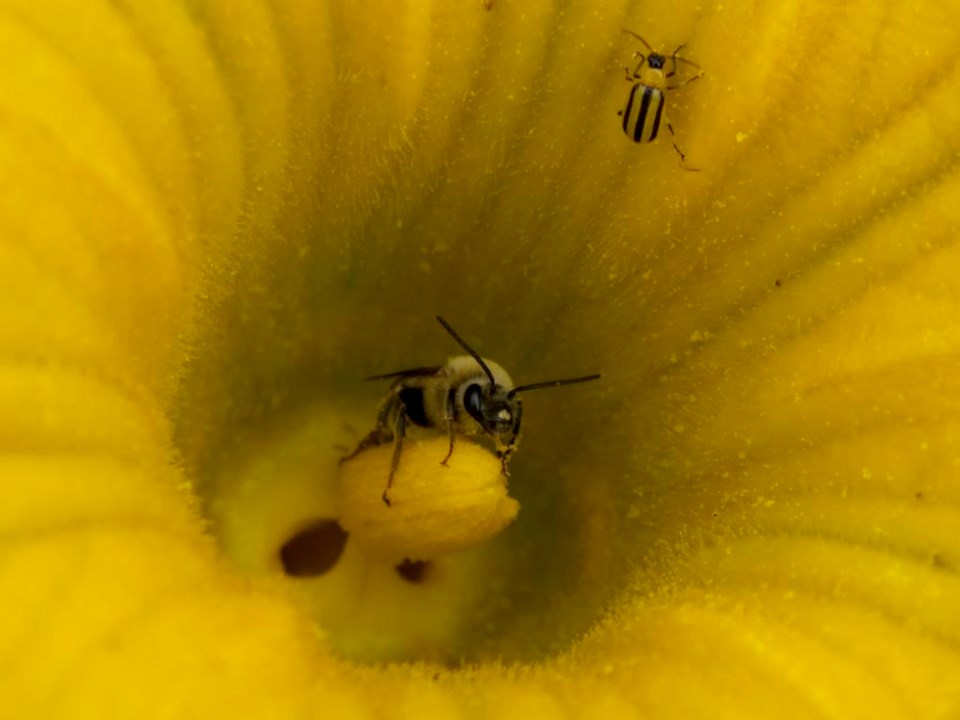A popular insecticide used on farms across Canada has been shown to have dire effects on ground-nesting bees, according to new research from the University of Guelph.
Female hoary squash bees, workhorse pollinators on pumpkin and squash farms, dug 85 per cent fewer nests when exposed to crops treated with the neonicotinoid insecticide imidacloprid, the research indicates. Those bees also collected significantly less pollen and produced 89 per cent fewer offspring, the study shows.
"These populations just plummet," said lead author Susan Willis Chan, a post-doctoral fellow at the school.
The study, published recently in Scientific Reports, is the first of its kind to look at ground-nesting bees in a real-world setting, the researchers said.
Ground-nesting bees are notoriously difficult for researchers to work with, Chan said, partially because their nests cannot simply be moved as they are underground.
Chan said they captured female squash bees that had already been mated and introduced them to enclosures at a greenhouse on a farm near Guelph, Ont.
They planted squash crops and applied three treatments and left one without pesticide treatment.
Imidacloprid was applied to the soil when squash seeds were planted. Seeds treated with thiamethoxam, another neonicotinoid, was examined, as was the non-neonic, chlorantraniliprole, which was sprayed on the foliage of the plants.
The researchers followed the treatment guidelines given to farmers by the Ontario Ministry of Agriculture, Food and Rural Affairs.
Chan then recorded foraging and nesting behaviour after they introduced the bees in the summer of 2017. They repeated the experiment the next year using the offspring of those bees to measure the effect of the pesticides on their reproduction.
The majority of bees in the world are solitary, ground nesting-bees and the research fills in a knowledge gap for them, Chan said.
Bayer, which makes Admire, the imidacloprid used in the study, said the research requires "significant additional effort to determine the relevance of the findings under realistic conditions."
"No measurable treatment effects were found on either fruit set or fruit yield in all treatments (including imidacloprid) compared to the control, and the bee populations were not affected," said Bayer spokesman Komie Hossini in an email.
"This could suggest that there is not an ecologically relevant impact of the treatments, since bee pollination is essential for squash production."
He also said forcing the bees to nest in the treated plot for two consecutive years "may not be the case under normal farming practices, where squash production is rotated with other crops."
Much of the previous research on the deleterious effects of neonics has focused on honeybees, which nest in colonies away from soil.
Neonics attack the bee's brain by preventing signal transmission between neurons. Exposure has led to death and paralysis in honeybees. Honeybees exposed to neonics take longer foraging trips as they age, suggesting they are unhealthy, can’t fly as fast or have a hard time remembering how to fly home, research has shown.
Bumblebees, which also live in colonies, have experienced deleterious effects due to neonics as well, research indicates.
Bee populations have been declining worldwide for years as scientists try to understand why. Research points to neonics among the factors contributing to the decline.
About a third of the crops eaten by humans depend on insect pollination, with bees responsible for about 80 per cent of that figure, research has shown.
Hoary squash bees are a "large pollinating workforce," Chan said.
"Pumpkin and squash farmers don’t even have to think about pollination because they are so ubiquitous and common," Chan said.
Farmers use imidacloprid to battle the cucumber beetle, which damages squash and pumpkins.
"From a farmer perspective the thought of losing an effective product for pest control is unnerving, but we also realize that we need to be doing what's right," said Keith Currie, the first vice president of the Canadian Federation of Agriculture.
"We know that there are some studies that have shown that neonics in the ground and in the water aren't positive and so we want to make sure that we're using products that are safe to use while still serving the purpose of protecting our crops from pests."
There is a silver lining, Chan said, with the other neonic, thiamethoxam, which coated the squash seeds.
"We saw no effect on any of these measures with thiamethoxam," Chan said.
Squash bees exposed to the non-neonic chlorantraniliprole collected substantially less pollen, but there was no effect on nest establishment or offspring production, she said.
The results points to the "important sublethal effects" of exposure to neonics in the soil on bee behaviour and reproduction.
"Soil must be considered a potential route of pesticide exposure in risk assessments, and restrictions on soil‑applied insecticides may be justified, to mitigate impacts on ground‑nesting solitary bee populations and the crop pollination services they provide," the researchers wrote.
Health Canada has launched a special review of the use of various insecticides, including imidacloprid, on pumpkins, squash and watermelon to determine the risk to the squash bee.
It said the review is expected to be completed this spring.
This report by The Canadian Press was first published Feb. 26, 2021.
Liam Casey, The Canadian Press

